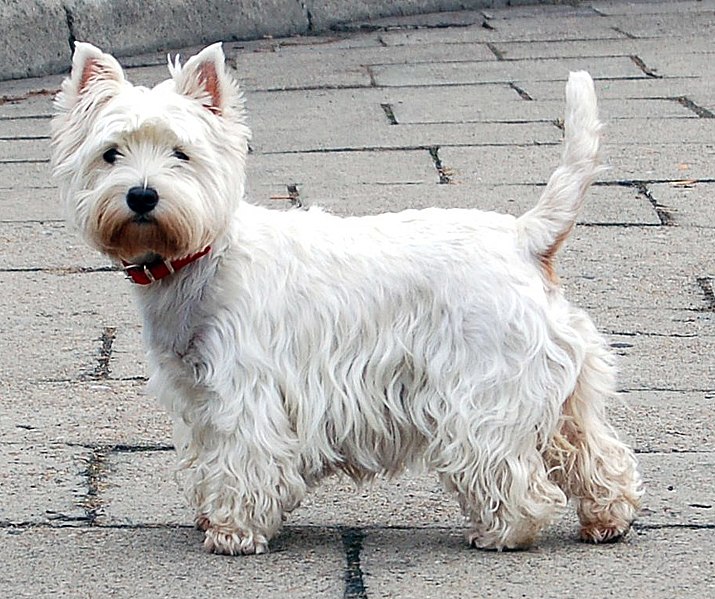The West Highland White Terrier is a descendent of the Cairn Terrier and the Scottish Terrier. These breeds occasionally spontaneously produce white puppies. Historically they were bred to chase rats and foxes across the moors, and this shows itself today in their innate curiosity. They need to be securely fenced or they could easily run off. This dog is commonly referred to as a ‘Westie’.
The Westie is a small and sturdy dog. It is tough in appearance with a thick white coat usually around two inches long. They have dark noses and dark, intense eyes and pointed ears which give them a look of alertness and intelligence. Their necks and chest are wide and muscular and they carry their short tails high.
These dogs are hugely energetic and curious. They are very playful and can often be found chasing or digging. However they do not need a lot of exercise to keep them happy and healthy. They need a lot of attention as, if left to their own devices for too long, they can become mischievous and it is not uncommon for them to chew things or dig up their owner’s garden. Another characteristic is their barking. They will bark when a stranger or any person approaches. Proper training is necessary to keep their barking to a minimum.
Although originally bred for hunting, the Westie makes an excellent pet for both families and seniors. Their temperament and playfulness makes them appropriate for families with children, while their size and lower need for exercise makes them a good choice for seniors. They are also a relatively clean dog and do not shed. Westies are prone to dry skin and allergies, which can easily worsen if they are bathed too frequently. They should only be bathed when necessary, but it is very important to ensure they are brushed regularly to maintain an even distribution of oils throughout the coat. It is also recommended that their ears be cleaned weekly to prevent build-up of oils and wax and prevent infection.

Like most dogs they need at least 13 hours of sleep every day. They will also nap during the day and can easily adapt their sleep pattern to match their owners. This generally healthy breed is susceptible to a genetic disorder called craniomandibular osteopathy. This is known colloquially as Lion Jaw, and can cause a great amount of distress and pain to a puppy when touched on the head or when eating. This may make the puppy less likely to eat, and it may also exhibit low levels of energy. Depending on its severity, this condition can be managed with medication and may resolve itself in time. Unfortunately, in cases when this does not happen, euthanasia may be necessary to relieve the dog from great distress.













